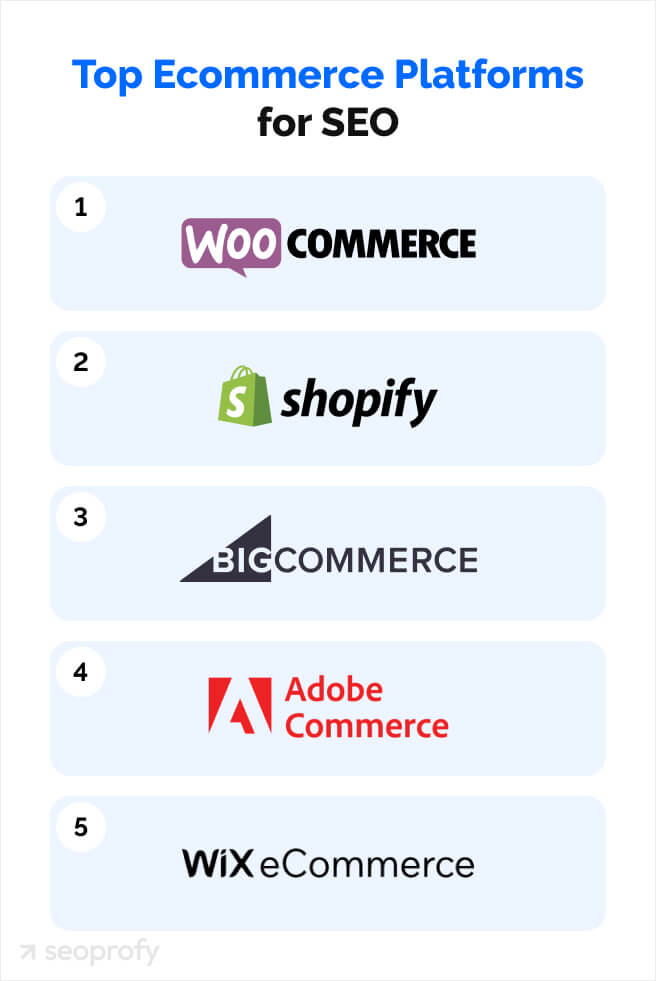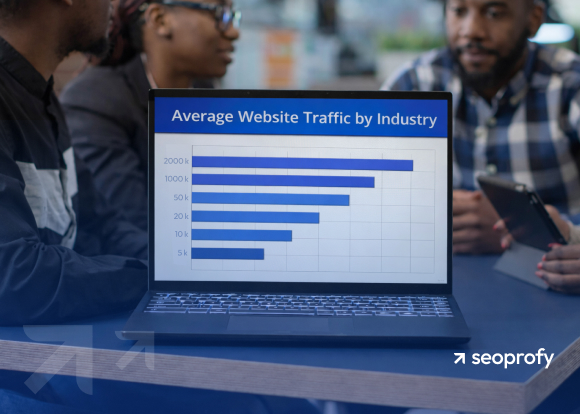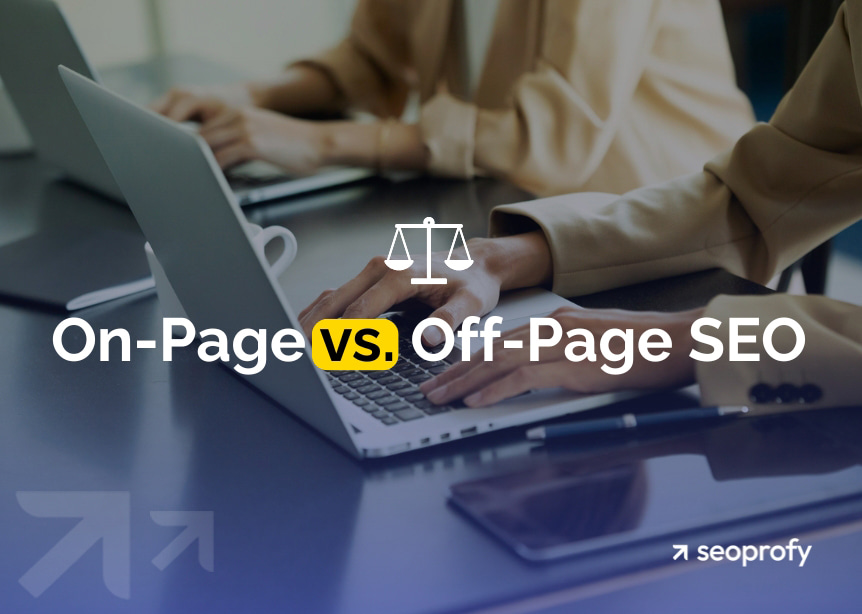If you’re planning to launch an ecommerce store, the most important thing at the start is to choose a flexible and SEO-friendly ecommerce platform.
A good ecommerce platform with strong SEO features can help you attract more customers, drive organic traffic, and rank higher in search results. With so many choices around, how do you tell which ecommerce platform is best for SEO, and what features to look for? Today, we’ll help you find the answers.
We are going to make a comparative analysis of the five most popular ecommerce platforms with all their pros and cons. Continue reading to find which one hits the mark for your business needs.
- WooCommerce: Ideal for WordPress users and those who need blogging features.
- Shopify: Best for businesses that prefer built-in SEO tools rather than plugins.
- BigCommerce: Well-suited for companies that want to scale.
- Adobe Commerce (Magento): A great fit for those who have technical teams and want full control over their URLs.
- Wix eCommerce: Perfect for beginners and startups that don’t have complex SEO needs.

Top Ecommerce Platforms for SEO in 2026
Here are the leading ecommerce platforms with SEO capabilities:
| Platform | Pricing | Features | Limitations | Best For |
| WooCommerce | Free + hosting costs | Customizable URLs
Access to SEO plugins Mobile optimization Built-in blogging capabilities Automatic XML sitemap generation |
Requires WordPress
More technical setup |
WordPress users and companies with smaller budgets |
| Shopify | $39 – $399/month | Customizable meta titles and descriptions
Automatic sitemap generation Structured data support Image alt text optimization SSL certification |
Transaction fees on some plans
Advanced SEO features need additional customization Rigid URL structure limits full customization |
Small to medium businesses |
| BigCommerce | $29 – $299/month | Automatic URL rewriting
Built-in blogging capabilities Rich snippets support SEO-friendly URLs Robots.txt editing |
Pages can load slowly
Meta tag customization is limited Can get pricey with sales limits on lower tiers |
Growing businesses that need scalability |
| Adobe Commerce (Magento) | Custom pricing (typically high) | Full control over URL structures and metadata
XML sitemap generation Advanced redirect options Layered navigation optimization |
Requires technical expertise
Higher development and maintenance costs |
Large enterprises with complex needs |
| Wix eCommerce | $17 – $159/month | Automatic sitemap generation
Customizable meta tags SEO-friendly URLs Structured data markup 301 redirect manager |
Limited features on lower plans
No third-party apps or plugins available Difficult to transfer your site to another platform |
Beginners and small businesses |
WooCommerce

WooCommerce is the first on our list because it’s a flexible and fully customizable ecommerce platform. It gives business owners access to useful functionality like:
- Customization of on-page elements
- Access to SEO plugins like Yoast SEO
- Easy integration with WordPress
- Mobile optimization
- Built-in blogging.
Pros of WooCommerce
WooCommerce comes with many perks for your ecommerce business. Here’s why this platform might be a good fit for you:
- SEO-friendly: This ecommerce platform offers essential SEO features, with complete control over meta titles and descriptions.
- Easily customizable: Since it’s open-source, WooCommerce offers you extensive customization options. You can tailor your store to your exact needs using themes, extensions, and custom code.
- Free to start: The WooCommerce SEO platform is free to download and use, but there are optional costs for hosting, extensions, and premium themes.
Cons of WooCommerce
Although WooCommerce is a solid platform, it also has disadvantages:
- Takes time to learn its functionality: Non-technical users can find WooCommerce difficult to set up and maintain. This is especially true when it comes to more advanced customization.
- Requires plugins for additional features: If you want extra optimization features, you’ll need to rely on plugins. Because of this, the platform is not ideal for those who want everything built in.
Shopify

When looking for the best ecommerce platform for SEO, Shopify consistently comes up as one of the top options. This platform has an intuitive interface and is great for beginners with no technical skills. Some features that make Shopify a good choice for your online store are:
- Sitemap generation
- Automatic canonical tags
- 301 redirects
- Mobile-friendly design
- SSL certification.
Pros of Shopify
Shopify provides multiple benefits for ecommerce businesses, for example:
- Many SEO apps: Users get access to apps like SEO Manager and Booster SEO. These can be used to optimize meta tags, improve site speed, and analyze keyword performance.
- Structured data support: Shopify supports structured data (schema markup), which helps search engines better understand your content and can lead to rich snippets in search results.
- Built-in SEO tools: The platform allows users to edit meta tags, add alt text, and create URL redirects to improve their search engine optimization.
- Easy integration with analytics tools: Users can sync data from Google Analytics (GA) to monitor traffic changes and conversions. Shopify also has a Facebook Pixel integration, so you can also track actions like purchases and page views.
Cons of Shopify
With its customization features and a variety of apps, this best-rated SEO platform for ecommerce also has some cons:
- Rigid URL structure: Shopify doesn’t allow users to fully customize URLs. This makes it harder to create short, SEO-friendly URLs that help search engines better understand the content of your pages.
- Limited control over robots.txt: One aspect of SEO for Shopify to keep in mind is that you have limited control over the robots.txt file. Their platform automatically sets up this file and blocks search engines from indexing pages like admin and checkout.
BigCommerce

BigCommerce is among the leading ecommerce platforms for business owners who aim to build an SEO-friendly ecommerce website. It gained much popularity because, just like Shopify, it is quite easy to use even for people who know nothing about coding. This platform also offers some of the most sought-after features, like:
- Mobile optimization
- SEO-friendly URLs
- Microdata and rich snippets
- Automatic 301 redirects
- Robots.txt editing.
Pros of BigCommerce
Here’s what makes BigCommerce the best ecommerce platform for SEO for many online stores:
- Built-in SEO features: BigCommerce comes with comprehensive SEO tools that make it easy to optimize your online store without needing to be a tech expert.
- Automatic redirects: The platform manages 301 redirects for you in the case of URL changes. You can avoid SEO issues like broken links and retain your website’s search engine rankings.
- Rich snippet support: BigCommerce uses structured data markup that makes your products stand out in search results with rich snippets. This helps increase your click-through rates and generally improve your visibility online.
Cons of BigCommerce
Despite the impressive benefits, BigCommerce also has several disadvantages to consider:
- Page loading speed: BigCommerce sites can be slow due to template-driven design, which negatively impacts user experience and search rankings.
- Limited meta tag customization: Users may find that the customization options for meta titles and descriptions are not as extensive as desired. Their ability to fine-tune on-page SEO elements is limited due to this.
- Higher prices for higher revenue: BigCommerce’s Pro plan has limits on yearly sales. If your website generates high revenue, you’ll need to switch to their pricier enterprise plan.
Adobe Commerce (Magento)

Next on our list as the best ecommerce platform for SEO is Adobe Commerce, also known as Magento. This is a fully customizable platform with which online business owners can sell their products easily. Some of the features included in Magento are:
- Generation of XML sitemaps
- On-page optimization tools
- Robots.txt management
- Advanced redirect options
- Layered navigation optimization.
Pros of Magento
Now, with the features covered, here are the pros of using Magento:
- Great customization: As an open-source platform, it allows users to modify code and templates to tailor their SEO strategy to specific needs.
- Many SEO capabilities: With Magento, businesses can customize meta tags, create SEO-friendly URLs, and generate XML sitemaps. The platform also creates canonical tags to avoid duplicate content.
- Scalability: Magento can handle large product catalogs and volumes of traffic without compromising its performance. Such scalability makes it the best ecommerce SEO platform for businesses that want to grow their product range and SEO efforts without having to change platforms.
Cons of Magento
So, what are the cons of using Magento?
- Technical complexities: Magento has a steep learning curve and, very often, requires coding skills to fully use its extensive SEO capabilities. Due to this, it’s not the best choice for smaller businesses without dedicated technical teams.
- Higher cost: Generally, the development, hosting, and maintenance costs for Magento tend to be higher compared to other ecommerce platforms.
Wix eCommerce

Our final contender for the best SEO ecommerce platform is Wix eCommerce. This platform is great for small- to medium-sized businesses that would like to get the most out of their SEO. Its advanced SEO features make all tasks smooth and easy for any business that aims to improve its rankings in search engine results. These features include:
- Customizable meta tags
- SEO-friendly URLs
- XML sitemap generation
- Structured data markup
- 301 redirect manager.
Pros of Wix eCommerce
As you can see, Wix is one of the top ecommerce platforms with great SEO features. Now, let’s look at the pros of using it:
- Personalized SEO setup checklists: The platform helps users develop effective SEO strategies for their sites based on their specific keywords.
- Integration with Google Services: Wix allows seamless integration with Google Analytics and Google Search Console. Users can track their site’s performance and optimize accordingly. This integration also simplifies the process of monitoring website traffic and search visibility.
- Optimized site infrastructure: Wix is built to make your site SEO-optimized. It automatically adds image alt text and uses smart tech to speed up loading times. Since page speed is a direct ranking factor, this helps improve both user experience and your position in search results.
Cons of Wix eCommerce
Thanks to its user-friendly interface, Wix is the easiest SEO platform for ecommerce. But it also has disadvantages:
- No third-party apps or plugins: Wix operates in a closed system, so you can’t add many outside apps or plugins to boost your site’s SEO rankings. This can limit how much you can customize things to fit your needs.
- Impossible to transfer your site: One big downside of Wix is that you can’t easily move your site to another platform. If you ever want to switch, moving all your content can be tricky and time-consuming.
What Is Important When Choosing the Best Ecommerce Platform for SEO?
When choosing the right ecommerce platform, a number of factors have to be considered. So, to help you make an informed decision, we’ve listed features you would want to look for to pick the best SEO ecommerce platform:
Customizability
Customizability refers to how much you can customize and personalize your layout, design, and SEO elements. A good ecommerce platform should let you adjust elements like meta tags, URLs, and the structure of your content for high SEO performance.
Page Load Speed
If your site or product pages take longer than three seconds to load, many visitors will go to other online stores. It’s also one of Google’s ranking factors, so it’s a good idea to pay attention to this when choosing a platform for your store.
Mobile Optimization
Another important aspect is mobile optimization — more than half of online shopping happens through mobile devices, such as smartphones and tablets. When your ecommerce store isn’t mobile-friendly, it’s difficult for users to navigate through your products, which can lead to lost sales and make it harder to reach high search engine rankings.
Basic SEO Features
The standard features in SEO-friendly ecommerce website builders include editing meta titles, meta descriptions, header tags, and alt text for images. If you can customize these elements, you will be in a better position to optimize them for both search engines and customers.
Canonical Website URLs
Canonical URLs help avoid problems with duplicate content. They tell search engines which version of a webpage is the main one. For example, if you have multiple links to the same product page, using a canonical URL lets you point to the primary version. This way, Google knows exactly which page to show in the results.
Sitemap Generation
The advantage of a good sitemap in terms of SEO is that search spiders will find and index your key pages much more quickly. You need to look for an SEO ecommerce platform that automatically generates and updates sitemaps for your ecommerce site. That saves you time and makes sure your website gets found by search engines.
Blogging Capabilities
The best ecommerce platforms for SEO like Shopify and WooCommerce come with integrated blogging tools that allow you to add new posts to your site with ease. Publishing fresh content to your site can attract organic traffic and engage your audience.
Social Media Integration
Most ecommerce platforms have social media integration that allows you to connect your site with Facebook, Instagram, and other social media. This helps you easily create shoppable posts on Instagram that link directly to your product pages. Even though social media doesn’t directly affect your search rankings, it can definitely drive more traffic to your site.
Integrated SEO Tools and Plugins
Platforms like Shopify and WooCommerce have various tools/plugins available that are intended to help you optimize your website for search. Their plugins, like Yoast SEO and All in One SEO, make keyword research and on-page optimization easier to manage.
Technical SEO Adjustments
Being able to manage the technical SEO aspects of your online store, like your robots.txt file and schema markup, is also important — they help Google understand which pages to ignore and prevent duplicate content issues. Ecommerce SEO platforms like Wix eCommerce let you customize them to suit your needs. In contrast, Shopify automatically generates a robots.txt file and doesn’t let you edit it.
Bottom Line
Now that we have gone over top SEO ecommerce platforms, it’s time for you to decide on your priorities and see whose features exactly fit your needs. The reality is that no platform will be perfect in terms of SEO, so your best bet would be to focus on your business goals when choosing a platform and delegate optimization tasks to an SEO agency. Expert agencies can help you improve your visibility in search, no matter the platform you use.
Whether you need expert assistance in choosing the best ecommerce platform for SEO success or want to optimize an existing ecommerce site, you’ve come to the right place. SeoProfy is an award-winning company that provides specialized ecommerce SEO services. We help business owners optimize their stores so that they can drive higher traffic and make more sales.
Ready to get a fully-tailored SEO strategy aligned with your goals? Schedule your free consultation today.













